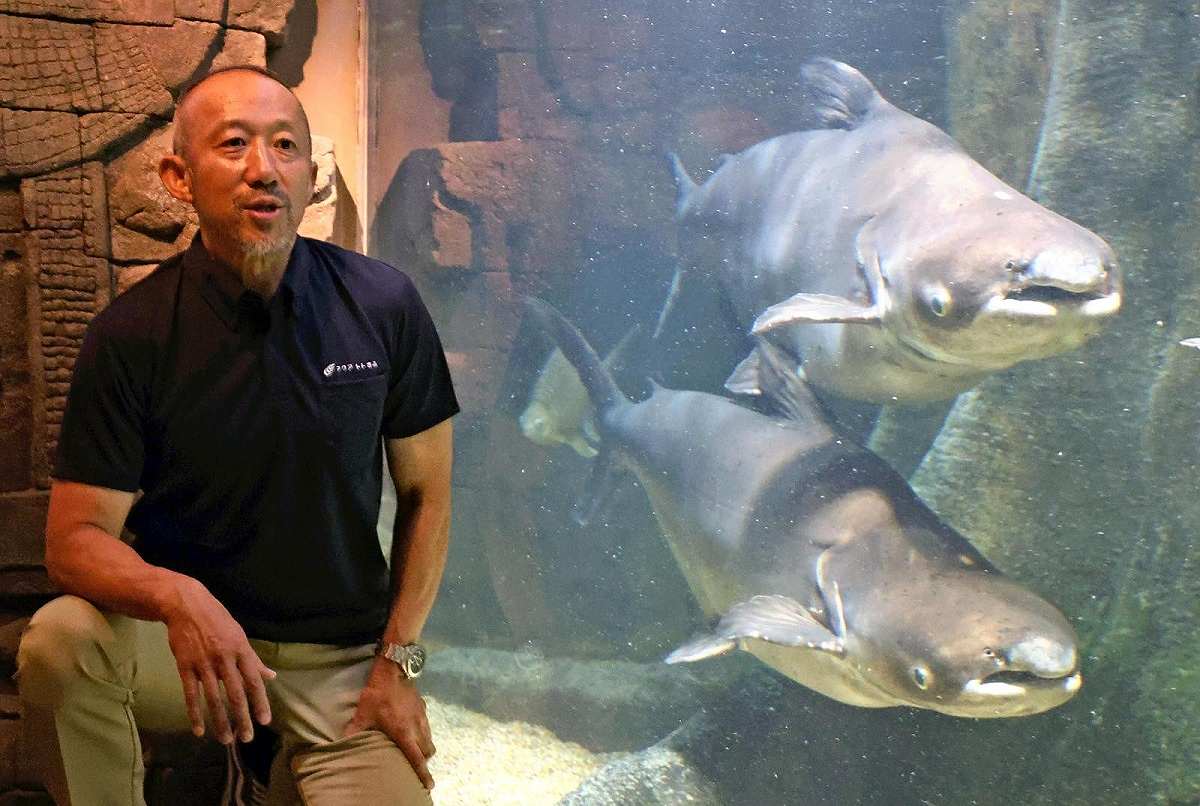
Koki Ikeya discusses the Mekong giant catfish at the Aquatotto Gifu Aquarium in Kakamigahara, Gifu Prefecture.
13:58 JST, September 21, 2024
GIFU — The Mekong giant catfish, one of the world’s largest freshwater fish, can go almost a year without eating. That’s according to research published this year by Koki Ikeya, director of the Aquatotto Gifu Aquarium in Kakamigahara, Gifu Prefecture.
But the discovery of this strange ability is just part in a decade of research. Ikeya and a co-author on the study are preparing for joint research with a university to elucidate the mechanism for the catfish’s fasting.
The Mekong giant catfish is found only in the Mekong River basin in Southeast Asia, and can grow as large as 3 meters long and weigh as much as 300 kilograms. It is said to live for about 60 years, but because it is in danger of extinction due to development and overfishing, its biology has been shrouded in mystery.
Aquatotto is one of the world’s leading freshwater aquariums, with more than 200 species of fish and amphibians. For its opening in 2004, the facility adopted six Mekong giant catfish from a fisheries experiment station in Thailand. The fish have been one of the main attractions at the aquarium since.
Ikeya, who oversaw their breeding, was determined to keep them alive and began monitoring how many blended feed balls — each weighing 30 grams — they ate.
However, some of them would suddenly stop eating, which made him concerned that they might be ill. With no abnormalities observed other than the fasting, Ikeya and others continued to monitor the fish until 2017 and found that five of the six sometimes went more than a month without eating. One male fasted for 315 days.
Their analysis found that a fasting pattern among the fish was based on an almost yearlong cycle. The finding suggests that for the Mekong giant catfish fasting may be an evolutionary adaptation, due to the Cladophora green algae they feed on becoming scarce during the rainy season in the Mekong River basin.
The paper by Ikeya and Kyoto University researchers was published online in January in the English journal of The Ichthyological Society of Japan.
Aquarium staff continue to keep records of the food intake of the fish, and Ikeya is responsible for the analysis. He has also been preparing for joint research with Kitasato University since April, to test the hypothesis that the Mekong giant catfish can turn on their fasting like a switch and enter an energy-saving mode.
During the planned joint research, the university aims to explore the similarities between the catfish and the sand eel, which it has been researching. The sand eel is known to enter a hibernation-like state in the summer when the water temperature is high, and then eat nothing.
“For me, the Mekong giant catfish is something that shows me the mysteries of life,” said Ikeya. “There might be discoveries that will be useful for helping humans to lose weight,” he laughed.
Top Articles in Science & Nature
-

Japan Institute to Use Domestic Commercial Optical Lattice Clock to Set Japan Standard Time
-

Japan to Face Shortfall of 3.39 Million Workers in AI, Robotics in 2040; Clerical Workers Seen to Be in Surplus
-

Record 700 Startups to Gather at SusHi Tech Tokyo in April; Event Will Center on Themes Like Artificial Intelligence and Robotics
-

iPS Treatments Pass Key Milestone, but Broader Applications Far from Guaranteed
-

iPS Cell Products for Parkinson’s, Heart Disease OK’d for Commercialization by Japan Health Ministry Panel
JN ACCESS RANKING
-

Japan PM Takaichi’s Cabinet Resigns en Masse
-

Japan Institute to Use Domestic Commercial Optical Lattice Clock to Set Japan Standard Time
-

Israeli Ambassador to Japan Speaks about Japan’s Role in the Reconstruction of Gaza
-

Man Infected with Measles Reportedly Dined at Restaurant in Tokyo Station
-

Videos Plagiarized, Reposted with False Subtitles Claiming ‘Ryukyu Belongs to China’; Anti-China False Information Also Posted in Japan






















